包阅导读总结
1.
关键词:Stack Overflow、开发者调查、技术、AI、工作
2.
总结:2024 年 Stack Overflow 开发者调查结果出炉,包括热门语言、技术偏好、工作状况、对 AI 的看法等。开发者不因 AI 感到威胁,多对工作中的技术债务感到沮丧,整体对工作较满意。
3.
主要内容:
– 2024 年 Stack Overflow 开发者调查结果公布
– 热门技术:JavaScript、PostgreSQL 等受欢迎,Rust 和 Markdown 受赞赏
– 编程语言:Javascript、HTML/CSS、Python 常用,Python 成最想要语言,Rust 受青睐
– 开发环境:Visual Studio Code 和 Visual Studio 受欢迎,Neovim 受赞赏
– 学习途径:多利用在线资源,82%靠此学习
– 开发者状况
– 年龄:受访者年龄增大,35 岁及以上比例上升
– 职业阶段:新手和中期开发者都在学习
– 薪资:多数非管理岗开发者年薪下降
– 对 AI 看法:多数认为不是威胁,虽对其准确性存疑,但使用意愿增加
– 工作感受:对技术债务沮丧,对工作整体较满意
思维导图: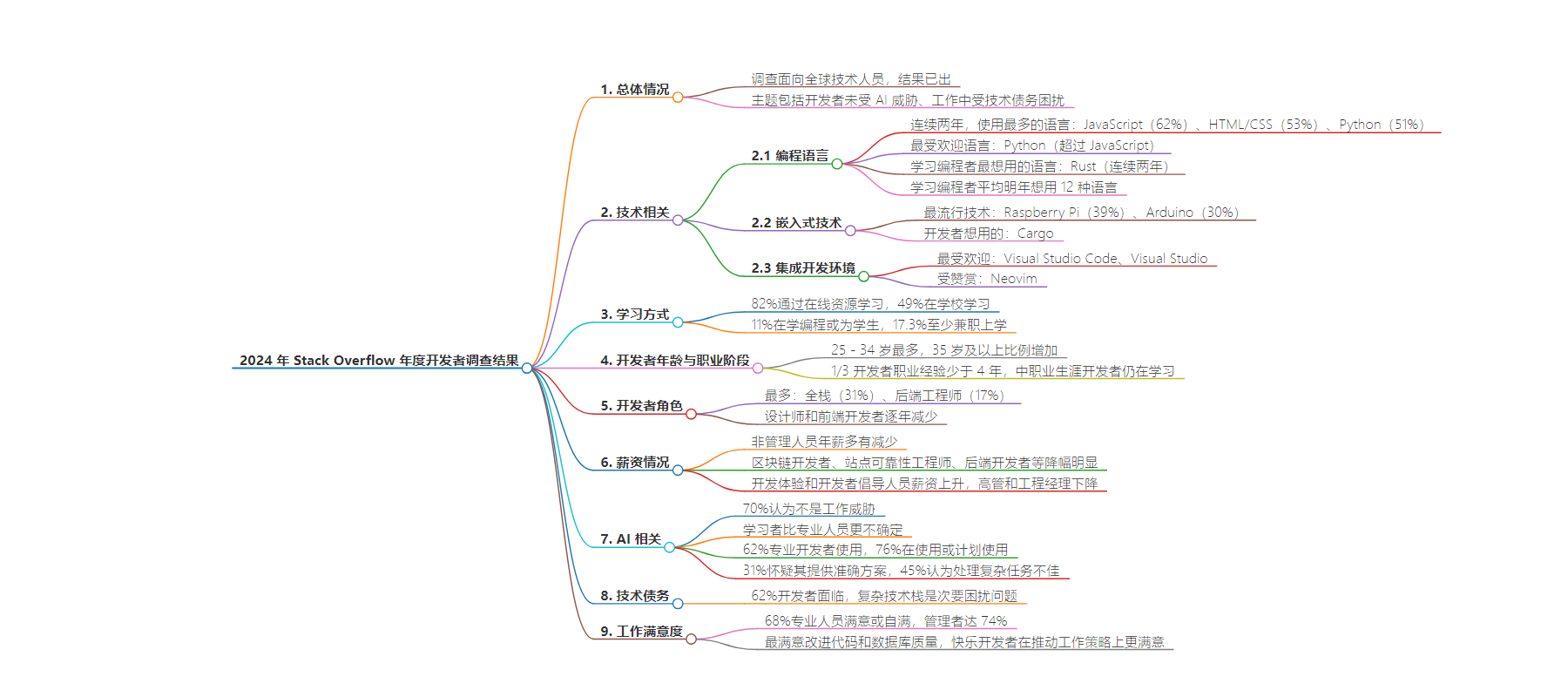
文章来源:stackoverflow.blog
作者:Erin Yepis
发布时间:2024/7/24 14:00
语言:英文
总字数:1440字
预计阅读时间:6分钟
评分:85分
标签:开发者调查,技术趋势,AI 在开发中的应用,技术负债,开发者教育
以下为原文内容
本内容来源于用户推荐转载,旨在分享知识与观点,如有侵权请联系删除 联系邮箱 media@ilingban.com
In May of 2024, we opened up the 14th annual Stack Overflow Developer Survey to technologists worldwide—and the results are in! This year, technologies such as JavaScript and PostgreSQL remain most popular, Rust and Markdown remain most admired, developers are most frustrated by technical debt at work, and they don’t see AI as a threat to their jobs. Themes we see in this year’s survey results show us that developers are not threatened by AI, and developers are most frustrated by technical debt at work. On the topic of AI, 76% of respondents shared they are using or planning to use AI tools, but only 43% said they trust the accuracy of AI tools and 45% believe AI tools struggle to handle complex tasks.
Technology, AI, work and more; there are so many new insights and statistics to dive into with our latest annual developer survey findings from developers worldwide.
It wouldn’t be a Stack Overflow Developer Survey if we didn’t add a few handfuls of new technology options for developers to weigh in on this year, and plenty of long-standing technologies are holding strong, too. Javascript (62%), HTML/CSS (53%), and Python (51%) top the list of most used languages for the second year in a row. Javascript is a long-time mainstay for Stack Overflow users, it has been the most popular language every year since the inception of the Developer Survey in 2011. Python is the most desired language this year (users that did not indicate using this year but did indicate wanting to use next year), overtaking JavaScript. The language that most developers used and want to use again is Rust for the second year in a row with an 83% admiration rate. Python is most popular for those learning to code. Those learning to code also indicated they want to use an average of 12 different languages next year.
This year, we added a section for embedded technology (looking at you, 3% of developers working with embedded tech). Raspberry Pi (39%) and Arduino (30%) top the list for most popular embedded technologies and users of both want to use Cargo next year, used by 16% of developers and also has a very high 83% admiration score.
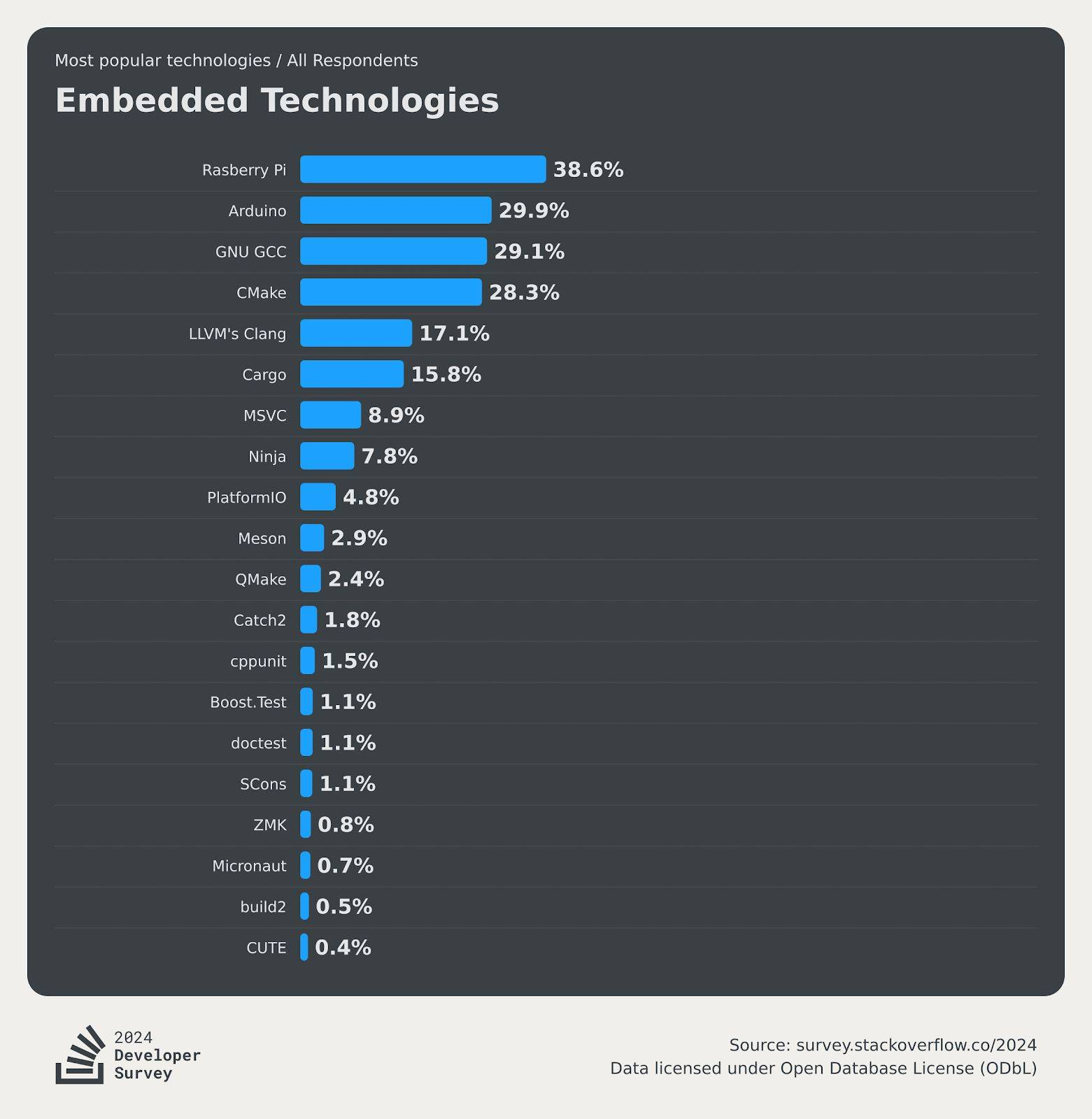
Integrated developer environments, loved and criticized by many developers, consistently rank Visual Studio Code and its nearest (and related) alternative, Visual Studio, as the top two most popular options even though there are so many to choose from. Developers like to learn, but this may be where they draw the line before implementing a change that crosses over into frustration territory. If there were an opportunity to switch things up, developers might opt for Neovim which is highly admired (83%). Visual Studio Code users are in fact only interested in trying Neovim or Vim next year.
Software development is a practice of perpetual learning, and it makes sense that we see this in our survey results. But learning doesn’t just happen in classrooms. Developers this year reaffirm what they have indicated for many years now: 82% are learning to code using online resources compared to 49% who are learning to code in school.
According to this year’s survey, 11% of respondents this year indicated that they are learning to code or identify as a student, 17.3% of respondents are going to school at least part-time regardless of learning to code or having a developer role outside of studies. Developers are going to traditional schools to learn more than coding, with 83% report having some level of post-secondary education, more than had indicated they learned to code in school. The range of skills that developers amass over their careers is impressive and it all centers around applying skills to solve problems and evolve workplaces.
Respondents this year were older than years past: the largest segment of developer respondents were 25-34 but those aged 35 and up are growing in proportion in the last three years. In 2022, 31% of respondents were aged 35 and up. In 2023, that age bracket grew to 35% and is now at 39% this year.
But even though our respondents are getting older, one in three developers are still less than four years into their professional career and even mid-career developers are still learning. Developers who are new to coding or still learning can take a tip from those who know: if they aren’t using Stack Overflow, 84% of developers are using technical documentation to learn. Of those using technical documentation, 90% use the documentation found in API and SDK packages.
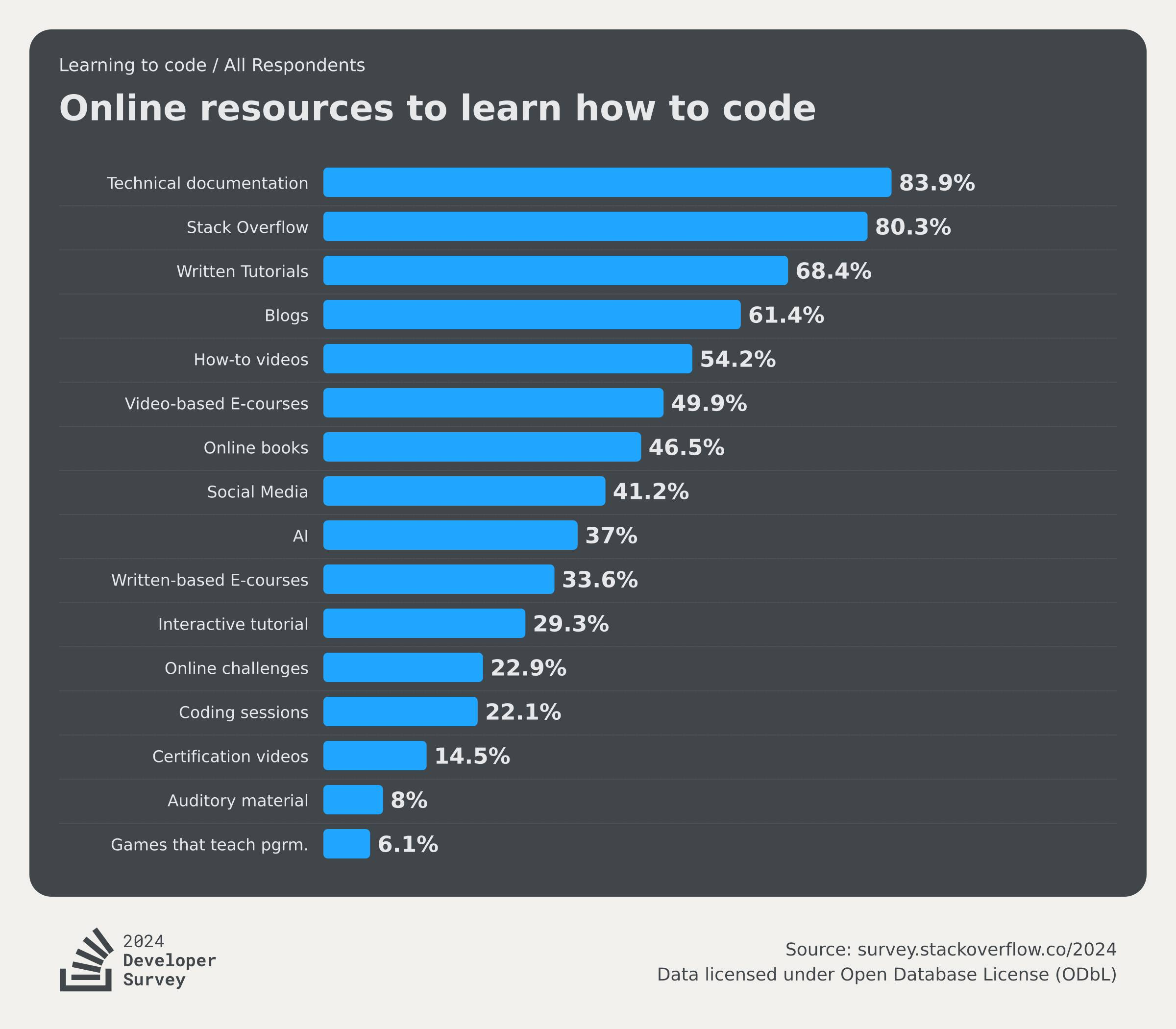
While it has been hypothesized that AI could affect developer roles, the trends we see in this year’s survey remain consistent over previous years. Most developers that responded to the Developer Survey are still full-stack (31%) or back-end engineers (17%), the top two roles for developers for six years running. 2018 was the first and only time more developers reported being back-end rather than full-stack. Designers and front-end developers have consistently decreased yearly. This is most likely due to the role being subsumed by other roles like mobile developers and enterprise developers.
Learning is great, but earning is better. Challenges in the world economy have been tough on many professions, including developers. Most developers that are not in a people manager position are reporting annual salary decreases of at least $10K annual USD. Certain positions have succumbed to market corrections based on the fickle nature of emerging technologies. This includes blockchain developers, who reported a median annual salary over six figures in 2023 and now report $86K USD annually. Pivotal roles such as site reliability engineers reported a decrease of $15K USD annually and back-end developers reported a $9K USD annual decrease. People managers and those supporting the coding environment are not immune to this trend: while developer experience and developer advocate professionals reported an increase in salary in 2024, senior executives and engineering managers are reporting a decrease in salary this year. Salary decreases are not an effect of changes in employment status: 80-81% of developers consistently report full-time employment over the last three years.
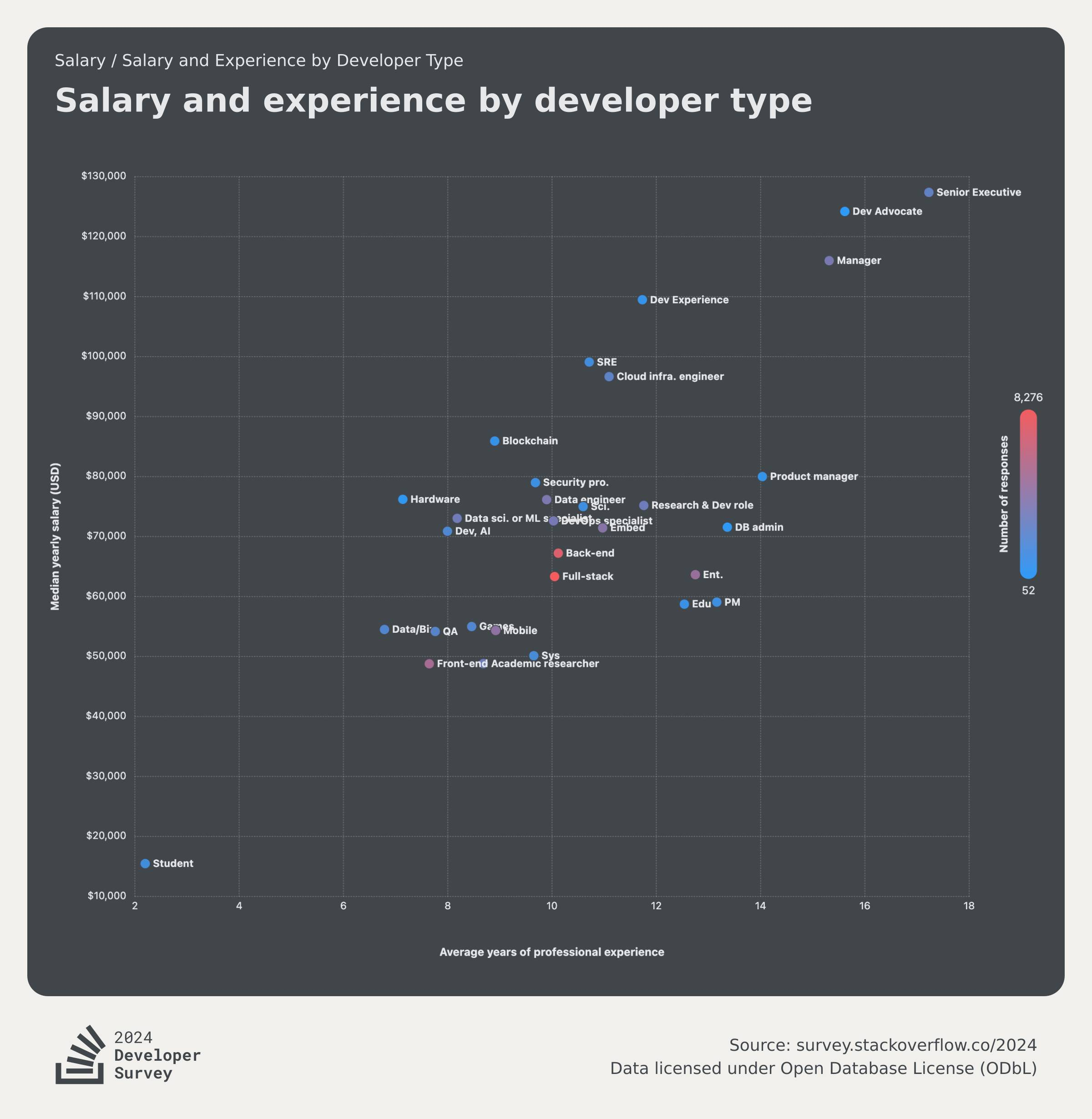
The salary woes are frustrating, but developers persevere. For the first time this year, we asked if developers felt AI was a threat to their job and 70% of professionals agreed it was not. Developers learning to code were more unsure about AI as a threat compared to more seasoned coders (27% of learners were unsure compared to 18% of professionals). It’s not for lack of trying: 62% professional developers are using AI tools this year compared to 44% last year. 76% of all respondents are currently using or planning to use AI tools. 72% of all respondents feel positive about using AI tools at work.
The promise of GenAI was its ability to deliver quick solutions and speed up time-consuming processes. However, 31% of developers remain skeptical (23% somewhat distrust and 8% highly distrust) that these tools offer accurate solutions and 45% believe AI tools are bad or very bad at handling complex tasks. AI is largely non-threatening because it has not replaced the human in the loop.
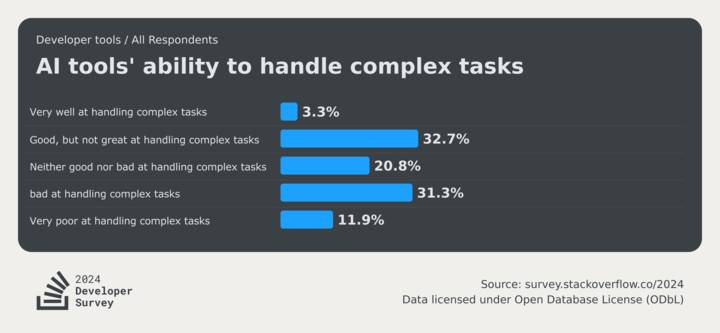
Technical debt is a problem for 62% of developers, twice as much as the second- and third-most frustrating problems for developers: complex tech stacks for building and deployment.
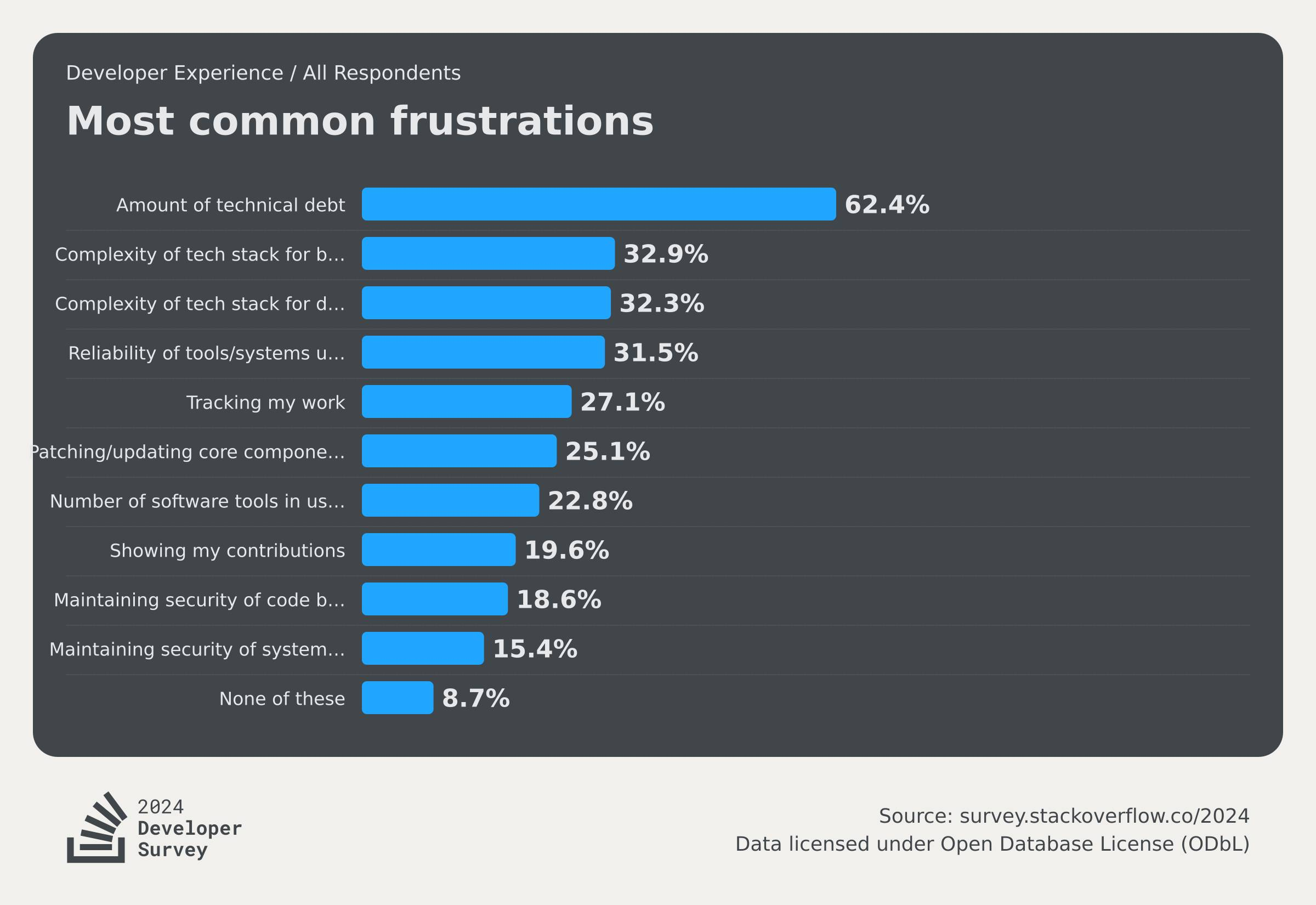
The bright side of the challenging work environment developers face is that 68% of professionals report being happy or complacent at work (for people managers, it’s 74%). All developers find the most satisfaction in improving code and database quality in their roles, and the happy developers find higher levels of satisfaction than most in driving strategy at work. There is work to be done, and most developers are making it through the pile of technical debt one work day at a time just fine.
What else is there to say that wasn’t said better by developers themselves? When asked about AI and how developers that used AI tools at work think it will change a year from now, last year’s responses were similar to how one developer put it: “I expect that as tools mature I will be able to switch from primarily writing to code to primarily reviewing generated code.” One year later, respondents answered the same question, and we saw that a recurring topic theme was “less time.” This developer’s response sums it up: “Less time spent writing mundane things.” Whether or not AI tools are giving you time back on mundane tasks, your time will be well spent checking out all the developer insights we have for you at our results site.
